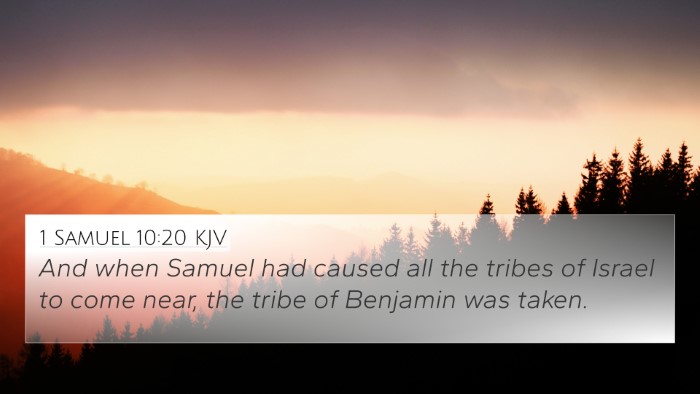Understanding 2 Samuel 3:19
Bible Verse: 2 Samuel 3:19 - "And Abner also spake in the ears of Benjamin: and Abner went also to speak in the ears of David in Hebron: and all that seemed good to Israel, and that seemed good to the whole house of Benjamin." (KJV)
Contextual Overview
In this verse, we see a significant moment in the narrative of the transition of power from Saul's house to David's reign. Abner, the commander of Saul’s army, is seeking to secure the support of the tribe of Benjamin for David, showcasing the political dynamics of Ancient Israel.
Commentary Insights
-
Matthew Henry's Commentary:
Henry emphasizes the importance of unity among the tribes of Israel and how Abner's actions were a crucial step toward reconciliation and the realization of God's plan concerning David's kingship. He highlights Abner's role as a mediator who seeks to gather support for David among his own tribe.
-
Albert Barnes' Notes:
Barnes discusses Abner’s strategy to gain favor with David by addressing the tribe of Benjamin first. This approach indicates the political maneuvering necessary during that period, underscoring the significance of tribal allegiance in establishing David's rule. Barnes notes how this moment reflects Abner’s shifting loyalties, which foreshadows future conflicts.
-
Adam Clarke's Commentary:
Clarke elaborates on the implications of Abner's actions, interpreting them as a pivotal movement towards a united Israel under David's kingship. He reflects on what it means for a leader to secure loyalty and the intricate relationships between tribes and leadership in Israel's early history.
Bible Verse Cross-References
Understanding 2 Samuel 3:19 can be enriched by examining related scripture. Here are some relevant cross-references:
- 1 Samuel 16:13 - The anointing of David as king points to the unfolding plan for his rule.
- 2 Samuel 5:1-5 - David is finally recognized as king over all Israel, completing Abner's mission.
- 1 Chronicles 12:29-31 - Details Benjamin's allegiance and the political significance of this tribe.
- 2 Samuel 2:8-10 - Abner's allegiance to Ish-bosheth, son of Saul, illustrates the division before unification.
- Proverbs 27:17 - Highlights the importance of relationships and support in leadership, relevant to Abner's dealings.
- Matthew 10:36 - Reflects the familial loyalty and conflict experienced within the tribes.
- Romans 12:10 - Discusses the bonds of brotherly love, applicable to unity among the tribes.
Thematic Connections
This verse connects with broader themes of power dynamics, loyalty, and the quest for unity amidst conflict. Biblical examples of kingship transitions often illustrate divine orchestration of leadership where human plans intersect with God's purposes.
Exploring Inter-Biblical Dialogue
The narrative outlined in 2 Samuel 3:19 opens the door for an inter-Biblical dialogue between the Old Testament and New Testament, addressing themes of leadership, sacrifice, and the fulfillment of God's promises.
Conclusion
2 Samuel 3:19 serves as a pivotal moment in the transition of power to David, driven by Abner's crucial role as a mediator. It is through careful examination and cross-referencing with other scriptures that one can truly appreciate the depth of the text and its implications for our understanding of biblical leadership and unity.
Tools for Further Study
For those looking to explore cross-referencing Biblical texts, consider utilizing a Bible concordance or a cross-reference Bible study guide. These tools allow for deeper insights into the connections between Bible verses and assist in identifying thematic links across different scriptures.





